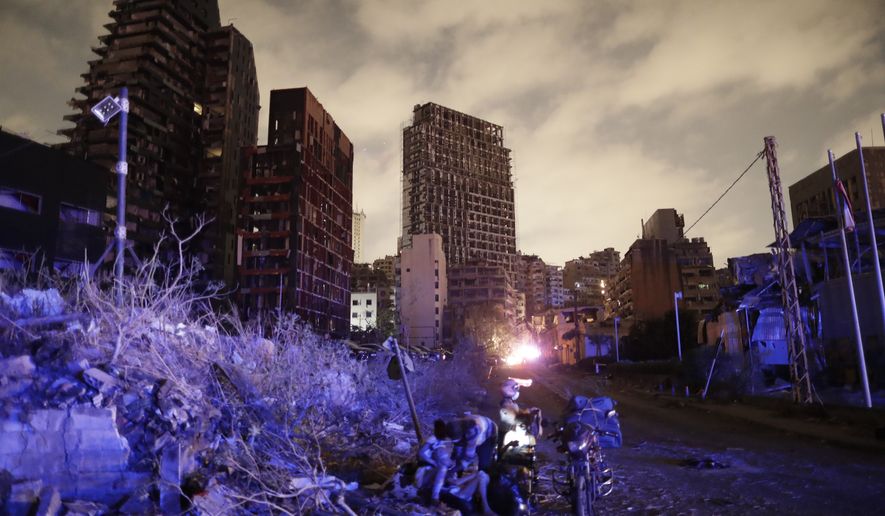A spectacular fire and massive explosion that briefly sent a mushroom cloud over the city rocked a port area in the Lebanese capital of Beirut on Tuesday evening, killing at least 100 people and wounding more than 4,000.
The force of the blast, which was heard 180 miles away on the island of Cyprus, came at a time already fraught with economic and political turmoil for Lebanon, sparking immediate speculation on the cause of the conflagration.
The cause of the blast remains unknown but Abbas Ibrahim, chief of Lebanese General Security, said it could have been caused by highly explosive material that was confiscated from a ship and stored at a nearby port. Early reports from local media claimed that a fireworks warehouse was involved after multiple cellphone videos showed sparks and flashes emerging from a giant column of smoke before the gigantic eruption.
Israel, which has clashed repeatedly with the Beirut-based Shiite Hezbollah movement in recent months, immediately issued a statement says it had “nothing to do” with the explosion, which sparked additional fires, blew out windows, caused buildings to collapse and overturned cars.
Beirut, which sits nearly 270 miles north of Jerusalem, has previously seen conflict and bombings by Israel. But Tuesday’s explosion appeared to be a homegrown disaster, only adding to the tensions in a country that has long been an economic engine of the Arab world.
“It was a real horror show. I haven’t seen anything like that since the days of the [1975-1990 civil war],” said Marwan Ramadan, who was about 500 yards from the port. He told The Associated Press that he was knocked off his feet by the force of the explosion.
SEE ALSO: Trump calls Beirut explosion likely ‘attack’
Lebanese leaders appeared to be focused on dangerous and explosive materials stored in the port facilities. President Michel Aoun said it was “unacceptable” that 2,750 tons of ammonium nitrate were stored for six years without safety measures.
“I promise you that this catastrophe will not pass without accountability,” Prime Minister Hassan Diab said in a televised address Tuesday evening. “Those responsible will pay the price,” he said.
The blast came at a particularly sensitive time for the country. Protests have erupted over the government’s handling of the worst financial crisis since the end of the country’s sectarian civil war in 1990. Many have been thrown into poverty as the currency has plunged in value against the dollar.
It also came just days before the climax of the highly anticipated trial over the killing of former Prime Minister Rafic Hariri, who died in an explosion in 2005. A verdict is expected on Friday.
Beirut’s governor, Marwan Abboud, broke into tears as he toured the site, saying, “Beirut is a devastated city.”
Lebanese officials have said the incident is more likely to have been an accident rather than a deliberate attack, the BBC reported.
The Lebanese Red Cross said the toll was at least 100 dead and more than 4,000 wounded, The Associated Press reported.
Dozens of emergency teams from across the country raced toward the scene to assist, while the city’s hospitals were struggling to keep up with the high influx of patients.
The Lebanese Red Cross said that every available ambulance it has in North Lebanon, Bekaa, and South Lebanon were dispatched to Beirut to support rescue and evacuation operations.
President Trump sent his “deepest sympathies” to the people of Lebanon after what he called a “terrible attack.” There have not yet been indications that the incident was an attack.
He said at his daily coronavirus daily briefing that the U.S. stands ready to assist the country and will be ready to help when called upon.
Secretary of State Mike Pompeo on Tuesday evening sent his “deepest condolences” to those affected by the explosion.
He doubled down on the comments later, saying he had conferred with military advisers who he said think the massive explosion was an attack on the city.
“It would seem like it, based on the explosion,” Mr. Trump told reporters at the White House. “I met with some of our great generals, and they seem to feel that it was [an attack]. They seem to think it was an attack, it was a bomb of some kind.”
• Dave Boyer contributed to this article, which is based in part on wire service reports.
• Lauren Toms can be reached at lmeier@washingtontimes.com.




Please read our comment policy before commenting.